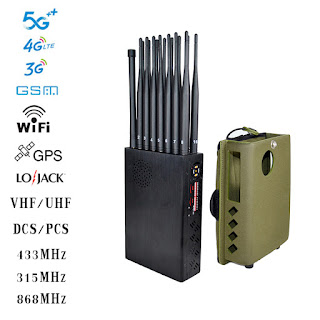Lebih kecil, lebih baik, dan lebih murah: Rise of Portable Drone Interceptors
By Elisabeth Gosselin-Malo
Milan, Italy - Anti-drone weapons manufacturers say they are increasingly miniaturizing and simplifying their solutions to meet the growing demand for man-portable weapons as recent conflicts highlight the importance of mobile capabilities.
Portable counter-drone systems (C-UAS) have been around for some time, but their proliferation has accelerated in recent years amid the growing threat of weaponized commercial drones. In the 2019 C-UAS Database report compiled by Bard College's Center for Drone Research, 111 (21 percent) of the 537 market products analyzed were handheld solutions offered by more than 29 different countries.
Warren Brown, vice president of marketing at Fortem Technologies, explained that the purposes and ways in which these systems are used today have also changed over the past decade. "Historically, security details and protection for major events or critical infrastructure have been focused on fixed solutions. Recent conflicts in the Middle East and Ukraine have shifted the focus to 'mobile' systems that offer advanced radar detection capabilities, ease of deployment and portability, low overall operating costs, and low cost per use, "he said. The belief that counter-drone systems measures must be large-scale to be effective also appears to have changed to some extent.
Previously, many militaries relied on more traditional jamming signal alternatives to counter enemy UAVs because they lacked access or resources to more appropriate and reliable systems. However, Brown said that relying on the deployment of legacy equipment is not always effective because they are not necessarily developed to address the comprehensive and evolving technology behind the drone threat.
"Traditional cell phone jamming solutions have a low success rate, forcing people to use expensive and impractical systems, such as large missile weapons, or even deploy fighter jets to try to mitigate the threat - which is often ineffective against small, maneuverable and hard-to-detect drones," he said. The recent failed attempt by South Korea to shoot down its neighbor's drone for several hours shows this.
Manufacturers have taken note of these issues, redesigning on top of existing technologies to more effectively address the dangers posed by drones, especially smaller ones that may be more difficult to deal with. In May 2022, Fortem Technology sent portable DroneHunters to Ukraine, saying in a press release that the company took an existing C-UAS system and further miniaturized and simplified it for use as an expeditionary rapid deployment weapon.
Matt McCrann, CEO of DroneShield, believes this illustrates where this type of technology is headed. "Of course, our goal is always to take a feature and make it easier to use, more efficient and more cost effective." Smaller, better, cheaper, "he said.
DroneShield's handheld countermeasures, such as DroneGuns, offer many advantages. As a small, lightweight system with easy-to-transport anti-drone system capabilities, it can be stored in a sling in a vehicle, backpack or body as the battlefield changes. Powered by replaceable batteries, DroneGuns are non-kinetic and employ an electronic attack method, which means they can deliver unlimited "bullets" that are more economical than kinetic systems and can be operated more safely with minimal training.
In a similar way, other portable systems, such as Fortem's DroneHunters F700, offer countries a lower cost-per-use alternative than other higher-priced systems on the market. Brown pointed out that their weapons cost just a few hundred dollars per shot, which is much cheaper than high-energy systems such as electromagnetic pulse (laser) weapons, which also require a lot of power.
Another benefit of the Fortem system for suppressing UAVs is that the system can use cone-sleeve parachutes to shoot them down in a controlled manner, allowing reconnaissance and analysis of enemy systems and reducing collateral damage. This is in contrast to more traditional defense techniques, which can cause an enemy drone to explode or fall from the sky, often harming civilians and infrastructure in the process, or allowing it to return to its launch point without the need for potential research into its mission or location. It comes from.
Brown claims that in Fortem's more than 5,000 record captures, its solution has a 92% success rate. During the FIFA World Cup in Qatar, DroneHunters were further deployed to protect multiple stadiums. For DroneShield, McCrann said they are highly effective in both military and more traditional security environments, pointing to the recent example of using its DroneGun Tactical to neutralize four hovering drones during Brazil's presidential inauguration.
Despite the many advantages of these systems, MacLean warns that scaling down any given feature usually involves one or more trade-offs. "For electronic countermeasures, this (miniaturization) trade-off is often reflected in the total power output of the system, where a smaller one may indicate a smaller effective range and need to be closer," he explained. However, in drone-to-drone scenarios, such as DroneHunter or similar systems, the tradeoff of electronic warfare payloads may be acceptable, since the engagement takes place at close range anyway.



Comments
Post a Comment